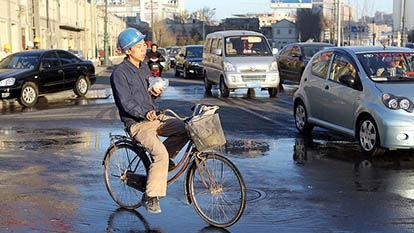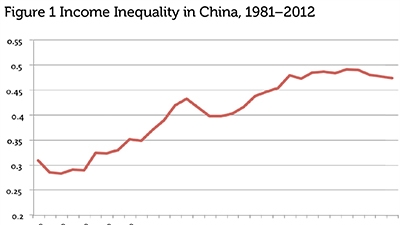
A migrant worker on his bicycle in Tianjin, China.
Photo: © Yang Aijun/World Bank
The quarterly newsletter Inequality in Focus continues to explore aspects of inequality in selected countries. In this issue, we take a closer look at China, where inequality has been rising in spite of policies seeking to narrow the gaps between rural and urban, haves and have-nots.
The second article is an interview with Ricardo Paes de Barros, the secretary of Brazil's Ministry of Strategic Affairs. He discusses the public uprising in Brazil in June 2013 and the role of government in a successful, emerging economy. Access the latest issue here.
The Challenge of High Inequality in China
In March 2013, before leaving office, China's then-premier Wen Jiabao delivered his final assessment of the state of Chinese society to the National People's Congress. He gave his administration mixed marks on its pledge to reduce income inequality. Wen warned that Chinese development had become "unbalanced."
China now ranks among the least equal countries in Asia and it is roughly on par with Latin American nations such as Mexico, Nicaragua and Peru. This does not mean that living standards among China's poorer groups have deteriorated.
Between 2002 and 2007, incomes rose nearly 50 percent among China's poorest 10 percent. The nation's poverty rate (percentage of population living below $1.25 a day) is estimated to have dropped from 19 percent to 8 percent during the same period.
Inequality in China is the result of even more rapid growth in incomes of richer groups, and it is strongly linked to urban-rural differences. In addition, income from private property is a newly emerging and potentially long-term source of inequality in the world's most populous nation. Read more.
Inequality and Unrest in Brazil: A Conversation with Ricardo Paes de Barros
An expert on poverty and inequality, Paes de Barros was recently named one of "the 500 most powerful individuals on the planet" by Foreign Policy magazine.
In this Q&A, he discusses the roots of the 2013 social unrest that gripped several cities around the country. Why are people protesting against the government in a country that made remarkable progress in recent years when it comes to reducing poverty and inequality?
The public initially demanded more affordable public transportation, but the protests later evolved into a variety of demands for better government services.
Paes de Barros notes that perceptions about the quality of government services do not necessarily reflect the fact that services have declined. Rather, they show that Brazil's growing middle class expects more from the country's leaders. "Hopes have climbed and...what previously seemed good now seems bad," he says.
In a short period of time, 40 million Brazilians have moved into the middle class where they are now participating in the formal labor market and paying taxes. With this comes a new awareness of how government allocates – or does not – allocate public funds.
Such changing aspirations present a big policy challenge for Brazil's leaders as they grapple with the question, "How do you handle success?" Read more.

China belongs to the world's least equal quarter of countries. A zero on the gini coefficient scale shown here represents perfect equality.
World Bank